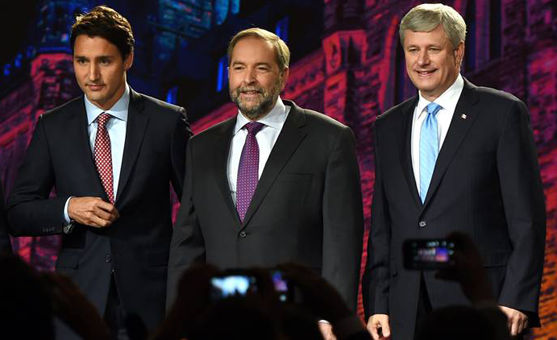Financial services associations have crafted their election wish lists during the current federal campaign, with topics ranging from growing the Canadian economy to bringing in tax-credit incentives for long-term care insurance.
Ian Russell, president and CEO of the Investment Industry Association of Canada (IIAC), says any party that wins the federal election on Oct. 19 needs to have a vision for the country that will help businesses grow and create jobs. Russell believes the key is for any new government to focus more than ever before on encouraging the expansion and growth of small- and mid-sized firms across the country.
Part of the reason why the Canadian economic climate has changed dramatically in the past year is because of the sinking price of oil.
Business growth
“So the challenge is: how do we achieve growth in the current environment and what are the policy tools that we should put in place to do it? I haven’t heard (as yet) very much about a growth agenda for Canada and quite frankly, I think that’s fundamental to the issue. Everything else, be it spending policy or tax policy and we’ve heard – a fair amount about that – is not where the primary focus should be.”
In its recent pre-budget submission, IIAC asked the federal government to bring in tax breaks that would help raise investment in small Canadian companies and startups.
“We need to maintain and improve the business climate in Canada which is along the lines of competitive tax structure, the confidence that the tax regimes will remain stable, the importance of good fiscal management and competitive taxes,” says Russell.
Banks and insurance
For its part, Advocis is planning to send questions to all party leaders on two key issues: the ongoing debate of where banks can sell insurance products and pensions.
Currently, banks cannot sell most insurance products in their branches, a situation meant to address consumer protection concerns around tied selling and privacy. However, the Bank Act is going through a review and must be amended by the spring of 2017.
To help its 11,000 members decide who to vote for in the election, Advocis is asking party leaders whether their party favours continuing the current insurance restrictions on banks.
It also wants to know each party’s overall position on pension and retirement income reform as it relates to the Canada Pension Plan and if they support pension reforms that would give Canadians the ability to access professional financial advice.
Challenges faced by advisors
The Independent Financial Brokers of Canada (IFB) wants support to ease some restrictions currently facing financial advisors.
Financial advisors are subject to regulatory and compliance requirements from a host of provincial and federal regulators, making compliance expensive and time consuming – a situation that must be balanced against the overarching objective of protecting consumers, says Susan Allemang, IFB’s director of Policy and Regulatory Affairs.
A number of federal initiatives, such as the National Do Not Call List, Canada’s anti-spam legislation and anti-money laundering regulations have created time-consuming expenses and barriers for financial advisors who want to contact prospective clients and build their businesses, says Allemang.
“IFB has been advocating for scaling these requirements in recognition of their impact on small financial businesses, which are already subject to licensing and market conduct oversight,” says Allemang.
Incentives for LTC insurance
With an aging population and concern that Canadians are not adequately saving for retirement and long-term care expenses, Allemang says IFB is asking that incentives, such as tax credits, be introduced to help encourage the purchase of long-term care insurance products, which will ultimately reduce the potential financial burden on family and provincial health programs.
Many Canadians incorrectly believe that their long-term care costs will be covered by governments, says Terry Zive, chair of the government relations committee at the Conference for Advanced Life Underwriting (CALU).
Long-term care insurance has had little pickup in Canada, although it has made considerable gains in the United States, mainly because premiums there are considered tax deductible, says Zive.
In its recent pre-budget submission, CALU asked that long-term care insurance become a qualified investment for an RRSP or RRIF. Alternatively, it suggests that annuitants be allowed to withdraw from their RRSPs or RRIFs up to $2,000 a year to a maximum $24,000 on a tax-free basis to fund the purchase of a qualifying long-term care insurance policy.
Zive said this suggestion, made in a previous year’s submission, was recommended by the House of Commons finance committee to the Minister of Finance but was not adopted in his previous budget.
“We have had further dialogue with a variety of members of the government and we have been encouraged to continue our work specific to this subject. We have talked to all three major parties and they all have significant interest in the subject.”
A second issue for CALU is to change the current tax rules to support the transfer of an incorporated small business to family members and therefore receive the same tax treatment as when the sale is made to a third party.
Fair tax rules for small business
Currently, if a small business owner wants to sell all his shares in his business to a third party, there is, generally speaking, an $800,000 capital gains exemption – an advantage not given to those who sell a business to a family member. Instead, the sale to a family member is treated as a taxable dividend and subject to a much higher level of taxation, says Zive.
On a business evaluated at $2 million, the sale to a family member could cost about $500,000 more in taxes than if the same business was sold to a third party, he says.
Tax-related promises from the three main parties
Here are some of the promises the three main parties have made during the election campaign:
Prime Minister Stephen Harper’s Conservatives promise to allow first-time homebuyers to withdraw an extra $10,000 tax-free from their RRSPs through the Home Buyers’ Plan (HBP). This would increase the tax-free withdrawal limit in the HBP to $35,000 from the current level of $25,000. Under the plan, Canadians can take funds from their RRSPs to finance the purchase or construction of their first home, as long as they pay back the funds within 15 years.
Federal Liberal Leader Justin Trudeau has promised to create a new tax bracket to benefit those with lower incomes. If elected, Trudeau says those with annual incomes of more than $200,000 will be taxed at a rate of 33%. Currently those with an annual taxable income of more than $138,586 are taxed at a 29% rate.
Federal NDP Leader Thomas Mulcair says that if elected, his government would reduce the tax rate for small businesses to nine per cent from the current 11 per cent. As well, he said an NDP government would extend – for an additional two years – the accelerated capital cost allowance for machinery or equipment used in manufacturing.








